2011年全国中学生高中英语能力竞赛泉州市级获奖名单
- 格式:doc
- 大小:245.00 KB
- 文档页数:5
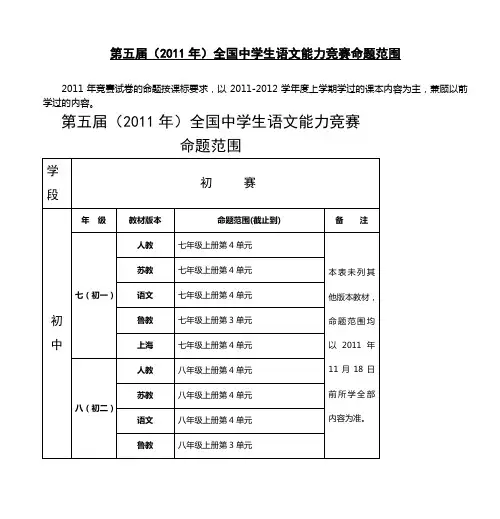
第五届(2011年)全国中学生语文能力竞赛命题范围
2011年竞赛试卷的命题按课标要求,以2011-2012学年度上学期学过的课本内容为主,兼顾以前学过的内容。
第五届(2011年)全国中学生语文能力竞赛
命题范围
本次竞赛命题将加强语文学科基础知识、基本技能的考查力度,全面考查学生语文综合运用能力和智力水平。
本届竞赛的初、决赛试题将学习借鉴国内外母语测试的理念,在题型内容和形式上进行改革创新,推动全国中学语文教学和测试评价的改革,特别是促进中、高考和平时语文考试的改革。
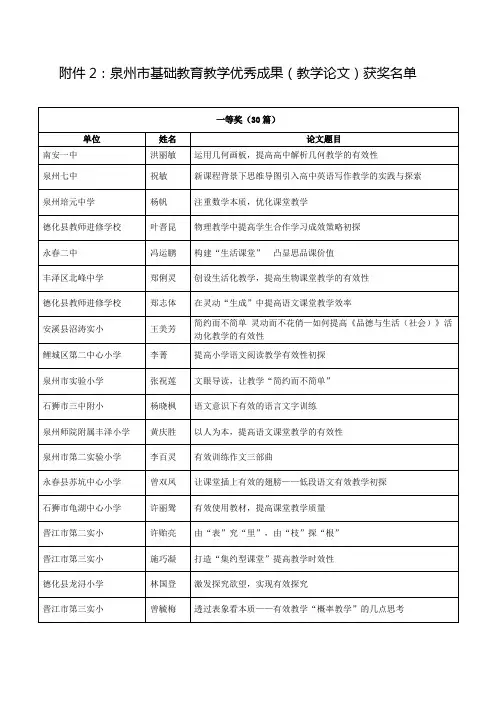

评选三好学生个人事迹800字(经典版)编制人:__________________审核人:__________________审批人:__________________编制单位:__________________编制时间:____年____月____日序言下载提示:该文档是本店铺精心编制而成的,希望大家下载后,能够帮助大家解决实际问题。
文档下载后可定制修改,请根据实际需要进行调整和使用,谢谢!并且,本店铺为大家提供各种类型的经典范文,如事迹材料、工作报告、合同协议、条据文书、策划方案、规章制度、心得体会、教学资料、作文大全、其他范文等等,想了解不同范文格式和写法,敬请关注!Download tips: This document is carefully compiled by this editor. I hope that after you download it, it can help you solve practical problems. The document can be customized and modified after downloading, please adjust and use it according to actual needs, thank you!Moreover, our store provides various types of classic sample essays, such as deeds, work reports, contract agreements, legal documents, planning plans, rules and regulations, insights, teaching materials, complete essays, and other sample essays. If you want to learn about different sample formats and writing methods, please pay attention!评选三好学生个人事迹800字评选三好学生个人事迹800字8篇评选三好学生个人事迹800字写什么?事迹材料可分为个人事迹材料和集体事迹材料,而典型经验材料主要指先进集体经验材料,实际中很少有先进个人经验材料。
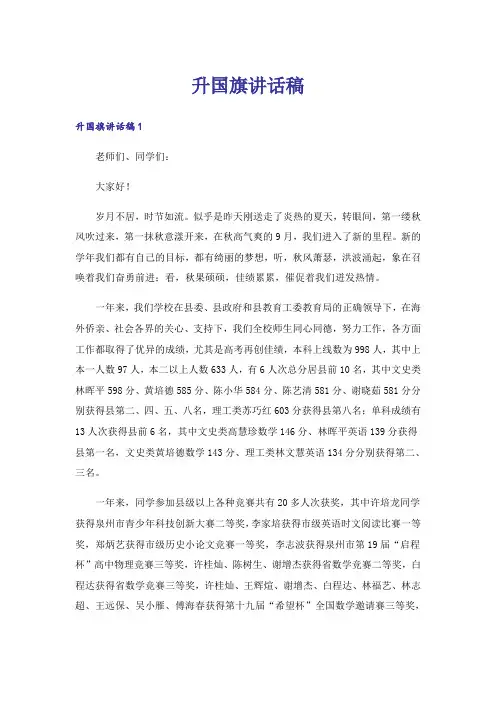
升国旗讲话稿升国旗讲话稿1老师们、同学们:大家好!岁月不居,时节如流。
似乎是昨天刚送走了炎热的夏天,转眼间,第一缕秋风吹过来,第一抹秋意漾开来,在秋高气爽的9月,我们进入了新的里程。
新的学年我们都有自己的目标,都有绮丽的梦想,听,秋风萧瑟,洪波涌起,象在召唤着我们奋勇前进;看,秋果硕硕,佳绩累累,催促着我们迸发热情。
一年来,我们学校在县委、县政府和县教育工委教育局的正确领导下,在海外侨亲、社会各界的关心、支持下,我们全校师生同心同德,努力工作,各方面工作都取得了优异的成绩,尤其是高考再创佳绩,本科上线数为998人,其中上本一人数97人,本二以上人数633人,有6人次总分居县前10名,其中文史类林晖平598分、黄培德585分、陈小华584分、陈艺清581分、谢晓茹581分分别获得县第二、四、五、八名,理工类苏巧红603分获得县第八名;单科成绩有13人次获得县前6名,其中文史类高慧珍数学146分、林晖平英语139分获得县第一名,文史类黄培德数学143分、理工类林文慧英语134分分别获得第二、三名。
一年来,同学参加县级以上各种竞赛共有20多人次获奖,其中许培龙同学获得泉州市青少年科技创新大赛二等奖,李家培获得市级英语时文阅读比赛一等奖,郑炳艺获得市级历史小论文竞赛一等奖,李志波获得泉州市第19届“启程杯”高中物理竞赛三等奖,许桂灿、陈树生、谢增杰获得省数学竞赛二等奖,白程达获得省数学竞赛三等奖,许桂灿、王辉煊、谢增杰、白程达、林福艺、林志超、王远保、吴小雁、傅海春获得第十九届“希望杯”全国数学邀请赛三等奖,张咏嘉获得福建省第十七届中学生生物学竞赛预赛二等奖,李钦渊和陈友福获该竞赛三等奖。
老师们、同学们,成绩的取得代表过去,在新学年开始之际,让我们站在新的起点上,一起出发,统一思想、勤奋工作,努力学习,坚持“以人为本、全面发展、德育见长”的办学理念,朝“争创一级达标,争当一流学校”的目标继续前进。
具体有以下几点要求:1、要坚定不移地朝“争创一级达标,争当一流学校”的目标迈进这个目标要实现,还要做许多前期的准备工作,如教学质量的提升、新课程的管理、办学特色的创建、校内设施的改造、各种设备的添置等等工作。
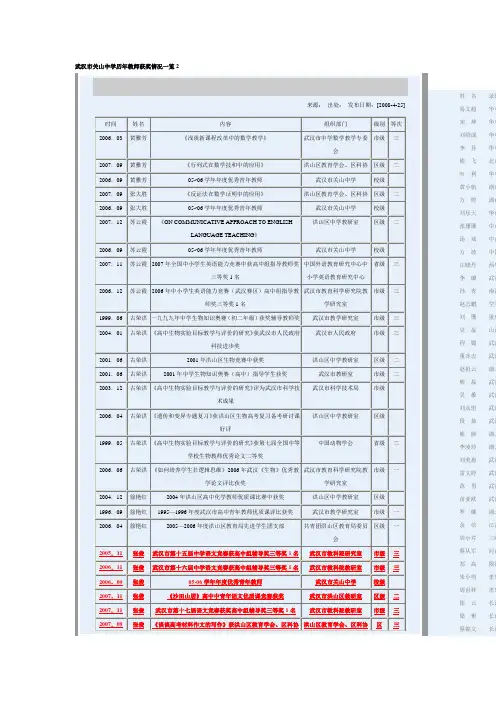
武汉市关山中学历年教师获奖情况一览2专业委员会2006.09 李小萍05~06学年度优秀老师武汉市关山中学校级2005.10 李小萍《从杜十娘看“三言”女性悲喜剧》第二届全国文学教育高峰论坛获奖华中师范大学语文教学与研究杂志社省级二2005.12 李小萍《爱、平等、沟通——构建和谐师生关系三要素》2005年全区中小学德育论文评比获奖洪山区教育局政教室,洪山区教育学会德育专业委员会区级二2004.04 李小萍《为有源头活水来》2004年论文评比获奖武汉市洪山区教研室区级二2003.05 李小萍国际楚才杯作文预赛暨洪山区作文竞赛获辅导奖武汉市洪山区教研室区级一2003.05 李小萍《谈高中语文新教材和读本配合使用》2003年论文评比获奖武汉市洪山区教研室区级一2002.12 李小萍《雨中登泰山》获综合性学习方案设计比赛奖武汉市教研室、武汉市中语会市级二2001.05 李小萍《爱莲说》教案获奖武汉市教研室、武汉市中语会市级三2002.09 李小萍洪山区2002年度优秀教师武汉市洪山区教育局区级1995.05 余坤明《中国数学奥林匹克等级教练员评审条例》授予该同志中国数学奥林匹克贰级教练员称号中国数学会奥林匹克委员会2002.10 余坤明洪山区中青年数学优质课获奖洪山区中学教研室区级一2001.06 余坤明2000~2001学年度洪山区先过班集体武汉市洪山区教育委员会区级2001.04 余坤明《将“减负”落实在课堂教学中》获洪山区数学优秀论文奖洪山区中学教研室区级三2005.05 余坤明《学习新课标的体会》2002年洪山区初中数学论文评选获奖洪山区中学教研室区级二2002.05 陈方意《天文活动与学会观察能力培养》科普论文二等奖湖北省天文学会省级1996.03 陈方意武汉市中学生“了解国情,热爱祖国”知识竞赛辅导学生获奖一等奖1名、二等奖3名、三等奖3名湖北省地理学会省级1996.12 陈方意1996年青少年科技教育活动获优秀会员称号洪山区青少年科技站区级2000.01 陈方意1999年科普教育活动获优秀会员称号洪山区青少年科技教育协会区级1998.07 陈方意97~98学年度洪山区中小学优秀科技教育园丁洪山区教育委员会、区科协区级1994.10 陈方意全国首届摄影比赛古代天文仪器、文物摄影三等奖中国天文学会普及工作委员会2007.12 刘蝶芬《浅淡文化背景知识介绍对高中英语教学的重要性》获论文评奖洪山区中学教研室区级2007.11 刘蝶芬《浅谈中学英语阅读课教学法》2007年湖北省优秀教科成果奖湖北省教育科学研究所省级三2007.11 刘蝶芬2007年全国中小学生英语能力竞赛获高中组指导教师奖一等奖2名、三等奖7名中国外语教研中心中小学英语教育研究中心、武汉市教育科学研究院2002.10 胡明燕《“四位一体”教学法实验研究》被列入全国基础教育外语教学研究资助金项目重点课题,已结题,实验效果显著国家基础教育实验中心外语教育研究中心点击对话友情链接胡明燕英特尔未来教育项目培训考核结业湖北省教育厅2006.09 胡明燕2005~2006年度洪山区优秀教师武汉市洪山区教育局2002.12 胡明燕全国第二届中小学生信息技术创新与实践活动“网络英语”竞赛辅导获奖中小学信息技术创新与实践活动组织委员会省级一2005.01 胡明燕2003-2004学年度学校优秀教师武汉市关山中学校级2005.06 胡明燕《英语课堂教学中多问几个“WHY”》洪山区优秀论文评比获奖洪山区中学教研室区级2003.10 胡明燕《活化课堂知优化课堂教学》洪山区优秀论文评比获奖洪山区中学教研室区级2003.10 胡明燕《Unit 2 English around the world》洪山区优秀教案获奖洪山区中学教研室区级2004.09 胡明燕《活化课堂知识优化课堂教学》武汉市英语教师论文评比获奖武汉市教育科学研究院市级2007.05 胡明燕洪山区第七批“优秀青年教师”称号武汉市洪山区教育局区级1998.01 胡明燕1997-1998学年度全国中学英语能力竞赛获辅导教师奖一等奖1名、二等奖2名市教研室、市中学英语教研会市级2000.12 胡明燕2000年武汉市中学生英语能力竞赛获辅导奖二等奖1名、三等奖2名武汉市教育学会中学外语教学研究会市级[关闭窗口]学校地址:湖北省武汉市关山邮编:430074鄂ICP备05004659号┋网站设计:信息中心┋管理员邮箱:root@(仅交流网站建设)。
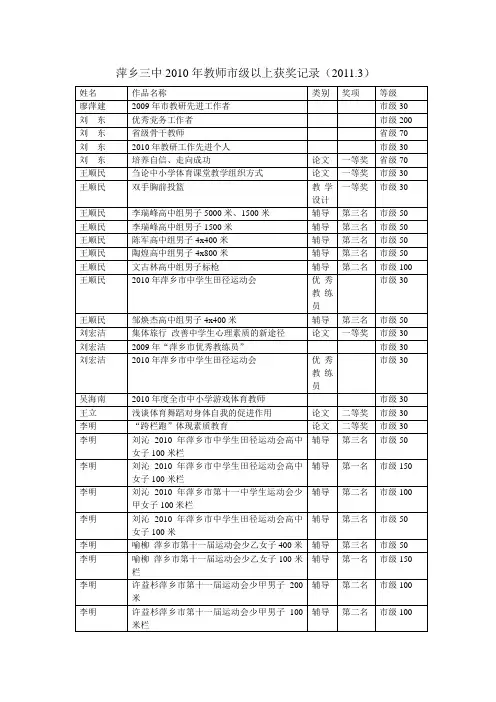
中学生申报三好学生事迹800字以上8篇中学生申报三好学生事迹800字以上8篇中学生申报三好学生事迹800字以上有哪些?事迹是过去做过的较重要的事情。
我们身边的许多有骨气的动人的事迹,还有它积极的教育意义,是值得我们学习的。
下面是小编精心收集的关于中学生申报三好学生事迹800字以上的内容,欢迎参考借鉴。
中学生申报三好学生事迹800字以上(精选篇1)一个普普通通的阳光女孩,就读于民勤一中高三宏志班,是一名品学兼优、全面发展的优秀高中生。
她助人为乐,勤奋好学,孝敬长辈。
在她身上虽没有轰轰烈烈的感人故事,但她以最普通的生活事迹诠释着人间的真善美,以最平凡的行动践行着中华民族的传统美德。
她无私奉献、助人为乐。
在她的心灵深处从小就种下一棵“关爱、助人、奉献”的种子。
__年的“5.12”大地震发生后,她主动把最爱的书籍、玩具和衣服等捐给了灾区。
在平常生活中,她曾多次和伙伴们去敬老院看望老人,带去了温馨的帮助和甜蜜的快乐。
也曾不知多少次捐助过大街上乞讨的残疾人,无论是一元、五元、十元,小小爱心,如涓涓流水滋润着她心中的“爱心”之树。
她勤奋好学,从小养成了良好的学习习惯,形成了严谨、敏捷的思维习惯。
面对枯燥紧张的高中学习生活,她却当成了磨练顽强意志的机会。
在她看来,学习中最大的乐趣就是在勇于拼搏、战胜困难之后获得知识并取得优异的成绩,使自己的思维能力和水平得到很大提高。
__年的寒假,她拟定计划,每天学做一顿饭,既减轻了父母的负担,还提高了生活自立能力。
不做不知道,一做才明白,父母每天费尽心机做她爱吃的饭菜是多么辛苦!从此,她每次吃饭时总不忘给父母盛饭倒水来感恩父母。
__年秋天,她以优异的成绩被西北师大附中录取,她却放弃了去兰州就读的机会。
她认为去兰州上学给父母带来太多的牵挂和经济负担,只要好好学,在民勤一中也一定能考上好大学!在她做出决定的那一刻,心里已经装满了对父母的爱和关心,她已经长大了。
一份耕耘一份收获。
在父母的关爱、老师的教导和同学们的帮助下,她取得了骄人的成绩。
高中生英语阅读理解能力不足的原因及提高策略作者:寇彩霞来源:《知识窗·教师版》2014年第08期无论是一线教师的教学实践,还是专家的教学研究,阅读理解都是重要的研究课题。
高中生也充分认识到它的重要性,经常高呼“得阅读者得天下”。
笔者从教学实践中发现,学生虽然把阅读理解摆在重要的位置,但却未能真正懂得什么是阅读理解。
他们只是简单地认为做阅读理解题就是逐字逐句地把原文读完,理解每一句话的意思,然后开始做题。
很显然,这不符合《英语课程标准》对阅读理解能力的要求。
那么,如何有效帮助高中生提高英语阅读理解能力呢?一、让学生正确认识阅读理解有位专家说过:“阅读理解就是阅读的理解,而不是我的理解。
”这句话说得非常好,很多学生会忽略这一点,在做题时往往加入自己的主观臆断。
所以,要提高学生的阅读理解能力,教师就必须让学生明确什么是阅读理解。
《高中英语课程标准》对学生的阅读技能提出了如下要求:“能根据上下文、句子结构、构词法猜测词义;能理解段落各句子之间的逻辑关系;能找出文章中的主题,理解故事的情节,根据上下文线索推理、预测故事情节的发展和可能的结局;能从一般文字资料中获取主要信息和观点;能理解阅读材料中不同的观点和态度;能理解文章主旨、作者意图;能提取、筛选和重新组织简单文章中的信息;能利用上下文的线索帮助理解;能识别不同文体的特征;能通过分析句子结构理解难句和长句;能根据情节及上下文猜测不熟悉的语言现象。
”由此可见,阅读的目的是为了获取解题所需的信息,而不是为了阅读而阅读。
二、高中生英语阅读理解能力不足的原因1.词汇量积累不足词汇是英语学习的基础,没有词汇何谈阅读,更不用说理解了。
一方面,很多高中生平时不重视积累词汇,给阅读带来了很大的障碍;另一方面,有些学生不能坚持完成每天的阅读和单词记忆的任务。
久而久之,他们会对阅读理解产生厌倦心理,甚至对英语学习失去兴趣。
2.不重视阅读技巧虽然有些学生平时注意扩充词汇量,死记硬背语法概念,也做了大量的习题,但是他们误以为只要认识每个单词,就不需要掌握阅读技巧。
大学本科学历。
大庆一中高中英语组备课组长。
黑龙江省骨干教师。
大庆市骨干教师,教学能手,高中英语学科兼职教研员。
大庆市优秀教师,师德标兵。
获黑龙江省中学英语教师基本功大赛一等奖,说课大赛一等奖。
主持国家教育部课题研究项目,被评为优秀教育科研主持人。
多篇论文在国家、省级刊物上发表。
全国中学生英语能力电视大赛优秀指导教师,全国“希望之星”英语能力大赛优秀指导教师,全国创新英语大赛优秀辅导教师,辅导学生多次在国家级英语竞赛中获一等奖。
2008、2011年所教班级英语高考平均成绩均超过130分。
王健中学英语中级教师大学本科学历。
黑龙江省教育科研骨干教师,大庆市骨干教师,教育科研骨干教师。
获国家级教学现场课评比大赛一等奖。
参加国家教育部课题《创新教育与学习能力培养实验研究》和主持省级课题《新课改下高中生英语学习自信心的培养研究》项目,被评为教育科研先进个人。
论文《英语语法教学的几点建议》、《高中生建立英语学习自信心的研究》发表在国家级期刊《人民教师》、《读与写》上。
全国创新英语大赛优秀辅导教师,全国中学生英语能力电视大赛优秀指导教师,辅导学生获全国中学生英语能力竞赛国家一、二等奖。
于振亚中学英语中级教师硕士研究生学历。
美国RICE大学进修。
大庆市师德模范,大庆一中优秀青年教师、模范班主任。
获全国中小学教师技能大赛一等奖、第七届全国高中英语教学观摩研讨优质课一等奖,全省学科教学渗透德育优质课评比二等奖,大庆市首届高中青年教师教学基本功竞赛授课能力一等奖、综合技能一等奖。
参加省级课题《英语校本教材开发应用研究》项目,研发英文版校本教材《魅力大庆》。
论文《浅谈英语新课程改革》等多篇发表在国家级刊物上。
辅导多名学生在第五届全国中学生英语听读能力竞赛中获国家一等奖,自己被评为优秀辅导教师。
夏朝雪中学英语中级教师大学本科学历。
国家三级心理咨询师。
大庆一中教学能手。
获第六届全国英语教师教学技能大赛一等奖、第十一届全国优秀教学设计大赛获一等奖、第十七届全国教育教学大奖赛一等奖、第二届新课程高中英语优秀课展评一等奖,大庆市高中教师基本功大赛一等奖。
泉州五中教务处2012-2013学年第一学期工作总结本学期来,在校长的正确领导下,在各处室和全体师生员工的共同配合、支持下,教务处的各项工作始终遵循学校办学方针和不断更新教学理念,坚持贯彻我校办学思想和育人目标,深入学习贯彻党的十八大精神,深刻领会和准确把握十八大对教育工作提出的新任务和新要求,坚持以邓小平理论、“三个代表”重要思想、科学发展观为指导,全面落实教育规划纲要,全面贯彻党的教育方针,全面推进素质教育,推行构建和完善学校课程体系,开展教育教学改革,探索行之有效的课程实施办法,创造性地实施国家普通高中课程方案,把课程改革作为教育工作的主题和核心内容来抓,努力开展和实践高中课程各项工作,规范教学常规管理,加强教育科研工作管理,不断提高教师教育教学科研水平和现代教育技术的应用水平,圆满完成学期初所制定的工作计划。
一、教学常规工作1、认真制定“三表”:课程表、备课组教学进度表、教研组工作计划表。
2、加强集体备课,共享集体智慧:依据《泉州第五中学普通高中新课程实验教师管理制度(试行)》、《泉州第五中学教师专业发展规划》等,认真研究教育教学理论,探索有效的教学方法,备教学内容、备学情、备教法、备学法、备习题;在教学上,统一目标、统一重点、统一进度、统一水平测试,强调备课组长对新教师在备课、授课等方面的指导,帮助新教师摸索教学规律、提高教学质量。
3、严格按照教育部和省教育厅颁布的课程计划,开足各种课程;制定本学期校本选修课开设计划,组织和指导2011级学生选课、校本课程登记申请和任课教师确认工作;加强校本课程开设和实施规范性,2011级高二年开设18门课程,含“开心语文”、“说英语”、“做物理”、“走进电影,走进心理”等精品课程;开设2012级高一年研究性学习系列讲座,布置研究性学习课题的立项、中期评估等工作,不断加强研究性学习开展的研究过程中动态记录。
4、坚决治理教辅材料散滥。
认真贯彻落实一个学科配备一套教辅材料和自愿购买原则,禁止学校和教师强制或变相强制学生统一订购或到指定书店购买任何教辅材料。